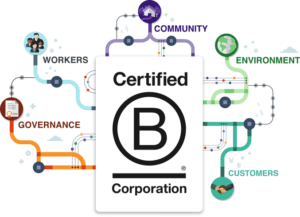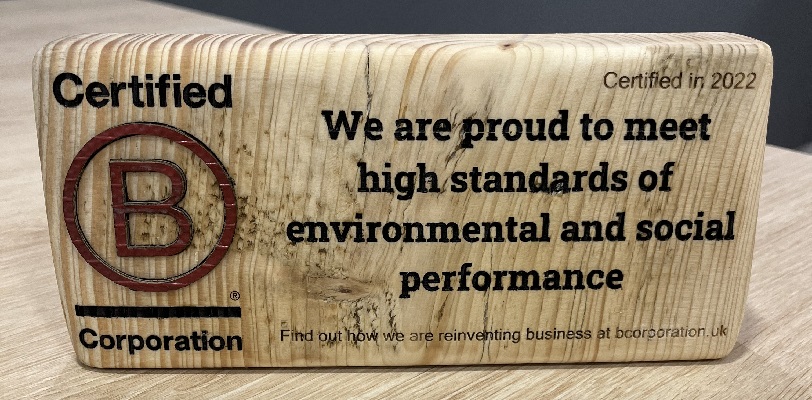Writing for Taxation magazine, BKL copywriter David Goldstein explores the growing interest among UK accountancy firms in becoming Certified B Corporations (B Corps), as BKL did in 2022.
Readers of a certain vintage may remember Sesame Street in its classic format, in which every episode focused on a letter and a number. In that vein, this article is brought to you today by the letter B and the number 4. B in this case does not stand for Big, so the Four may not be who you think.
To explain, let me start with three other letters which you’re likely to have seen together before: ESG.
Beginning
ESG (environmental, social and governance) refers to a framework for systematically measuring a business’s sustainability – how it operates as a long-term force for good – and for taking actions to reduce the risks and make improvements. Another way of expressing the ESG breakdown is: planet, people and purpose. ESG objectives may be driven by internal expectations (employees, leadership) or by external expectations (clients, job candidates, investors).
As expressed in James Egert’s Taxation article last year (What the tax director really wants for Christmas, Issue 4869), an ESG agenda should be developed in line with a company’s broader strategy – but in a sea of legal and compliance requirements, it can be challenging to know where to start and what to aim for.
A recognised framework for ESG improvements – with categories, scoring and verification – offers the solution. One such framework is B Corp Certification.
Balancing profit and purpose
Certified B Corporations, or B Corps, are a worldwide community of businesses that meet high standards of social and environmental performance, public transparency and legal accountability. B Lab, a not-for-profit network, provides this certification.
The first B Corp businesses were certified in the US in 2007. Today there are over 6,900 B Corps across 161 industries in 91 countries. Corporation is a misnomer: B Corps range upwards in size from one-person businesses to multinationals.
At the time of writing, nearly 1,400 B Corps are headquartered in the UK. The UK’s best known B Corps include The Body Shop, The Guardian, The Big Issue, innocent Drinks, Danone, Coutts, Gousto and giffgaff (who brought the B Corp logo to TV screens in their recent adverts).
[March 2025 update: there are now over 9,600 B Corps across 161 industries in 105 countries! The UK now has over 2,500 B Corps.]
2022 was the fastest year of B Corp community growth in B Lab’s history. The UK accountancy sector reflects this rise in popularity and prominence: of its 14 B Corps, half of them were certified in the past year. And four of those firms were among the finalists in this year’s Taxation Awards: BKL, Telic, Cooper Parry and Kreston Reeves.
If you heard mention of B Corps at the awards night, or elsewhere, you may be curious to know more about the role that certification has played in our ESG journeys.
Beyond
B Corp Certification offered us a broader structure for going beyond the positive steps we’d already taken. These included, as examples, BKL’s establishment of a charitable foundation and our partnership with social mobility charity LTSB; Telic’s sponsorship of a 10km charity fun run; Cooper Parry’s volunteering days; Kreston Reeves becoming carbon neutral.
For Yogesh Patel, Director of Telic, it represented an extension of the firm’s ethos: Telic means to express purpose. And with so few B Corps in the sector, it was an opportunity for a small firm to set an example for larger firms. (Prior to BKL’s certification in September 2022, all of the UK’s accountancy B Corps were outside the Top 100.)
Jennifer Williamson, Head of Culture and Values at Kreston Reeves, explains that they also started their B Corp journey when defining their purpose as a firm: “Guiding clients, colleagues and communities to a brighter future. The B Corp framework provides helpful benchmarks and registers our commitment to make continuous improvement.”
Other motivations for embarking on the B Corp process included accountability (Cooper Parry), commitment to improvement (Kreston Reeves) and stewardship (BKL). My colleague Myfanwy Neville, BKL’s Head of ESG and a member of the ICAEW Sustainability Committee, describes it as the aspiration to be “a Good business with a capital G”.
Bridges and bellwethers
At the heart of the process is the B Impact Assessment (BIA). Via an online platform, businesses have to provide detailed information and supporting documents concerning their contributions in five categories or pillars:
- Governance: overall mission, ethics and transparency
- Workers: financial, physical, professional and social wellbeing of people within the business
- Community: impact on the communities in which the business operates, recruits and sources from
- Environment: overall practices as well as impact on the air, climate, water, land, and biodiversity
- Customers: quality of products and services, marketing, data protection and feedback channels

With a BIA score of 80 points or more, a business is eligible to submit its assessment for review by B Lab. For transparency, every B Corp’s score is available via the B Corp Directory.
[March 2025 update: changes to the B Corp standards, affecting the pillars and scoring system, are due to be announced in April 2025.]
Depending on your size, and the resources you can dedicate to the BIA, it’s wise to allow 12-18 months to complete it. Nicoleta Ciobanu, Cooper Parry’s Head of Sustainability, notes that the bigger a business is, the harder the BIA becomes. She also points out the misconception that a business shouldn’t start the process before it feels ready, because any ESG journey will involve continual learning.
At both BKL and Telic, one person led the BIA evidence-gathering, combining independent work with involvement from colleagues. This enabled a wider group of people to share in the learning curve and understand the advantages of becoming a B Corp. At Cooper Parry, the educational quality of the BIA also served as a way to engage people.
While the BIA assesses a business’s positive impact, B Corp Certification has a separate risk review to assess potentially negative impact. This includes an evaluation of tax practices and tax advisory services where relevant. It could be compared to the Professional Conduct in Relation to Taxation.
The certification process also includes a rigorous phone interview. As a sign that certification is a serious commitment, not a badge of honour, B Corps are legally required to amend their articles of association to, in B Lab’s words, ‘formally embed consideration of all stakeholders … driving greater accountability’.
The BIA platform is free and open to all businesses. While not all of them choose to proceed along the B Corp path, over 200,000 have registered, showing how useful the BIA’s thorough and structured approach is. It’s well worth exploring as an ESG starting point.
Buzz, boost, belonging
The rewards of becoming a B Corp are varied. The sense of community is strong and immediate, particularly through the official B Corp forum, the B Hive. Yogesh at Telic notes the sense of shared values and forward thinking, and the potential to learn from and be inspired by fellow B Corps. It’s not unlike the Taxation Readers’ Forum, or indeed Sesame Street (“Friendly neighbours there, that’s where we meet”).
Nicoleta at Cooper Parry enjoys talking to clients who’ve expressed curiosity about B Corp Certification, as these conversations help to grow the B Corp community. More broadly, Yogesh at Telic has seen a growing interest in clients wanting to be “B Corp-esque” with goods businesses considering the impact of what they produce and private clients thinking ethically about tax and investment. And with wealth management companies becoming B Corps to serve this growing interest, Yogesh notes “a natural drip-feed from accountancy and tax advisers to other professional services sectors”.
Jennifer at Kreston Reeves explains that “people want to work with organisations that share common values with them and that our voice about our own purpose and values is amplified by joining a community of like-minded businesses. We place high value on what our people care about and recognise that we have an important role as a business to act responsibly and hold ourselves accountable for creating long-lasting positive change for the communities in which we all live and work.”
While the significance of B Corp Certification may not be as widely known as it could be, it has still had a noticeable effect on the employer side and the business side. Myfanwy at BKL has observed how it’s “opened a door in terms of candidates who also care about this way of doing business … people are coming to interviews and asking about it” and how it’s leading to enquiries from “purpose-led organisations that want to work with other purpose-led organisations”, fellow B Corps among them.
At BKL, when we celebrated B Corp Month in March, we were delighted by the number of B Corps who sent us snacks and drinks. One of them was graze; in a recent episode of the Reasons to be Cheerful podcast (29 May 2023), the CEO of graze, Joanna Allen, referred not to competitors in her sector but to “peers”. That’s the spirit fostered by the B Corp movement, and one that I hope this article has conveyed.
While becoming a B Corp should not be about competing, it is still about differentiating. B Corp Certification featured prominently in Telic’s Taxation Award winning entry for Best Single Office Tax Practice, and in BKL’s winning entry for Best Employer in Tax. It helped us to demonstrate our sense of purpose and our teams’ pride in that.

Building on it
Being accountable within a community of businesses at different stages of this journey encourages us to keep evolving and learning: what Yogesh at Telic calls “ESG CPD”. For the larger firms, there is the ongoing commitment to engage every team when it comes to ESG: at BKL we’ve relaunched our impact forum, Mosaic; Cooper Parry is one of a number of B Corps with internal ambassadors called B Keepers; and Kreston Reeves have created an internal KR Community group, aligning their ESG programme with four of the United Nations’ Sustainable Development Goals.
B Corps are required to recertify every three years. With this comes the opportunity to work towards higher BIA scores, particularly in our lower-scoring categories. This fits with our shared appreciation of ESG as a continuing journey where there are always more improvements to make and more people to engage. The prize isn’t the points: it’s the experience of learning and of encouraging colleagues and clients to take pride and feel invested.
It’s over a decade since Peter Bakker, CEO of the World Business Council for Sustainable Development, outlined how ‘accountants will save the world’ by considering ‘social and natural capital’, not just financial capital. B Corp Certification is a way of getting to grips with that challenge.
B is for…?
I realise that I’ve not yet told you what the B in B Corporation stands for. Does it in fact stand for nothing, like the T in Russell T Davies? Or is there a deliberate air of mystery, like the S in S Club?
The B officially stands for ‘Benefit for all’. As a B Corp employee among more than 600,000 worldwide, I’ve seen that there’s no shortage of benefits to undertaking B Corp Certification as part of the journey to become a better business in a better world – as the Sesame Street theme put it, “on my way to where the air is sweet”. I’m looking forward to counting more than four B Corps on future Taxation Awards shortlists; will your business be one of them?
Find out more about the UK B Corporation movement and the current certification process on the B Corp UK website.
This article was originally published in Taxation Issue 4894 and is also available on the Taxation website.







